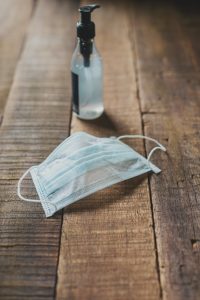A SCOTTISH university is using new developments in technology to create a face mask that is more effective in stopping the spread of Covid-19
Scientists at the University of Aberdeen are using “game changing” technology that will help them produce a face mask that provides a better barrier from the virus.
An £11,602 research grant from NHS Grampian Endowment Research Grant will allow the University to test the effectiveness of microfibres, which can help in neutralising the virus.

A team of researchers from the University’s School of Engineering and Institute of Medical Sciences, are aiming to use microfluidics to develop a new chemical substance they hope will provide a more effective barrier for Covid-19.
Scientists will develop a new experimental microfluidic device that offers the ability to test and prepare new nanomaterials.
Microfluidic devices exploit the physical and chemical properties of liquids and gases at a microscale, which is similar to Nanomaterials which are chemical substances manufactured and used at a very small scale.
The research is being led by Dr Alf Martinez-Felipe and Dr Wenbo Zhan from the School of Engineering, and Dr Claudiu Giuraniuc from the Institute of Medical Sciences.
Dr Martinez-Felipe said: “There are several challenges regarding the development of efficient masks, such as the ability to reuse them safely, or the deactivation of the virus in the masks to avoid further propagation by misuse.
“The aim of this project is to prepare new materials to increase the efficiency of face masks turning them into active barriers for Covid-19.”

Dr Giuraniuc added: “This is innovative cross-disciplinary research that combine the research strengths of the Institute of Medical Sciences and School of Engineering, that will explore the potential of microfluidics in achieving progress in a critical area of healthcare.
“We expect that our findings will open new avenues for research, and ultimately lead to the introduction of new and more effective materials for use in the mass production of commercial face masks.”
